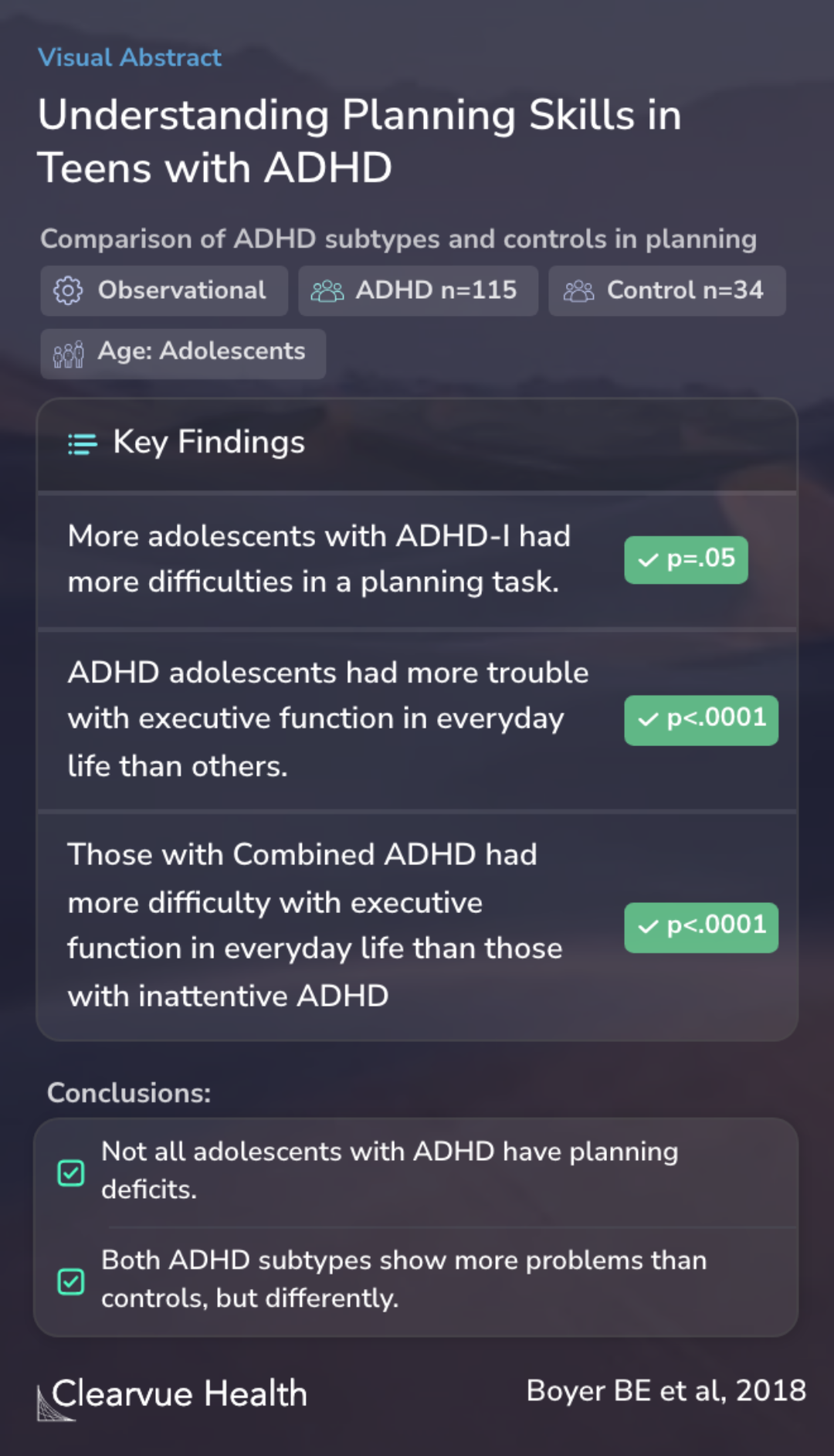Planning Skills of Adolescents With ADHD
Understanding Planning Skills in Teens with ADHD
Boyer BE, Geurts HM, Van der Oord S

Objectives
The study focused on understanding the planning skills of adolescents with ADHD. It used multiple methods to assess these skills and looked into how different subtypes of ADHD, inattentive and combined, affect these abilities. This approach aimed to provide a detailed view of how ADHD impacts planning skills in adolescents.
This study assesses planning skills of adolescents with ADHD using a multi-method assessment and explores subtype differences between inattentive and combined subtypes.
Methods
The research involved 115 adolescents diagnosed with ADHD and 34 typically developing individuals serving as controls. They underwent tests like the Delis-Kaplan Executive Function System (D-KEFS), the Behavioral Assessment of the Dysexecutive Syndrome (BADS), and the Behavior Rating Inventory of Executive Function (BRIEF). This comprehensive testing helped to evaluate the various aspects of executive functioning and planning skills in these individuals.
One hundred fifteen adolescents with ADHD and 34 typically developing controls completed subtests of the Delis-Kaplan Executive Function System (D-KEFS), Behavioral Assessment of the Dysexecutive Syndrome (BADS), and Behavior Rating Inventory of Executive Function (BRIEF).
Results
The study's results indicated some interesting patterns. For instance, the BADS Zoo Map test showed that adolescents with the inattentive subtype of ADHD took longer to complete planning tasks compared to those with the combined subtype and the control group. Moreover, the BRIEF results demonstrated that adolescents with ADHD, regardless of the subtype, faced more challenges in planning and executive functions in everyday life than their typically developing counterparts.
No group differences were found on the D-KEFS. The BADS Zoo Map test showed longer completion times in the inattentive than in the combined subtype and controls. The BRIEF showed more planning problems in adolescents with ADHD (both subtypes) than in controls, with the combined subtype s...
Conclusions
The study concluded that only a portion of adolescents with ADHD show planning deficits. This suggests the necessity of using various measures to accurately assess planning problems in adolescents with ADHD. The study emphasized the importance of including both standardized tests and more flexible neurocognitive assessments to get a complete picture of planning abilities in these individuals.
Only a proportion of adolescents with ADHD shows planning deficits. To capture these planning problems in adolescents with ADHD, it seems important to use multiple measures of planning, both ratings and "less structured" neurocognitive measures of planning.
Key Takeaways
Context
The current study is part of a larger body of research exploring the impact of ADHD on cognitive functions. It echoes findings from other studies, like the one by Roth et al. (2004), which examined the relationship between ADHD, verbal learning, and working memory. Their research suggested that ADHD individuals might struggle more with working memory and verbal learning, possibly due to anxiety rather than difficulties in organizing thoughts. This aligns with the current study's focus on the varied effects of ADHD on cognitive tasks.
Building on this, another study by Kofler MJ et al. (2018) also found a significant link between working memory deficits and organizational problems in children with ADHD. This supports the notion that ADHD's impact on working memory is a critical factor in the challenges these individuals face in organizing and planning. The current study contributes to this understanding by highlighting the planning difficulties in adolescents with ADHD.
Moreover, the research by Bikic A et al. (2017) sheds light on the potential for interventions to improve the skills of those with ADHD. Their study on Organizational Skills Training (OST) for children with ADHD found that OST can significantly enhance organizational skills, attention, and academic performance. This is encouraging as it indicates that targeted interventions can make a real difference in managing ADHD-related challenges, complementing the findings of the current study on the planning skills of adolescents with ADHD.
In summary, the current study contributes to our understanding of ADHD's impact on planning and cognitive functions. It fits into a broader research context that not only explores the challenges faced by individuals with ADHD but also points towards effective strategies for improvement.